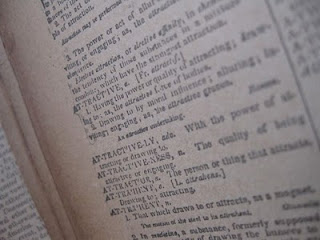Attractive is the base level. It is a series of facts, opt-ins or opt-outs: attractive is tidy, inoffensive, general. Attractive is a matching purse and a fresh haircut. Attractive is the safe zone, a step away from beautiful or alluring or even pretty; attractive is a way of speaking about one's looks without revealing vanity or arrogance. Attractive is a quiet, inexact mimicry of some of the traditional, lasting hallmarks of beauty—symmetry, proportion—accepting them where we're graced with them, deflecting or accepting or shifting where we're not. You cannot argue with attractive.
"I wouldn't say that, but yes, I'm attractive" or something similar is the #1 answer I've received when asking interviewees if they think they're beautiful. That's not to say there's no overlap between attractive and beautiful, but rather that beauty is about something we can't necessarily control, whereas attractive is more about showing that you're playing ball than it is about any particular effect or feature. "Anybody can make themselves attractive with a little effort," says one of my interviewees. "We all know what makes someone attractive or not attractive, and it's something that all of us can attain," says another. Beauty can range from oligarchy to plutocracy to even anarchy, if we're each our own pilot nations shapeshifting into beautiful depending on our mood, the light, our neighbors, whether we're in love, combustions of time, place, and genetics. Attractive is a democracy.
It's odd, though: attraction, even more than beauty, is subjective. I can't choose who I'm attracted to any more than I can choose whether I like the taste of Vegemite. It's a pull that's undeniable, even when we're talking about a strictly platonic relationship—we've all suffered from a lack of attraction, meeting people we really, truly, genuinely like and have a lot in common with but never really click with, right? And we've all met someone we shouldn't want to be closer with but yearn for anyway, right? We can control how loud we allow attraction to speak, but the fact of it, on some level, is out of our hands.
Yet we choose a word based on this unpredictable, indefinable chemistry—or is it physics?—to serve as our safe word, our base line, our beauty democracy. We choose a word that, at its heart, is about pheromones and sex as a way of discussing a sort of neutered beauty. Or is it that with attractive we're simply saying that, at its base level, an attractive person has the ability to attract, even if it's not the speaker whom s/he is attracting? Is that where the democratic connotation of attractive comes in?
I'm not arguing that we redefine attractive: We need a safe word. We need attractive both for its gracious ability to let us talk about beauty and appearance while managing to deflect inevitable accusations of conceit, and for its potential for magnetism. I simply wish for us to consider its source, consider its democracy, and consider it not as a lesser-than form of beauty but rather a tool we can use to examine something as complex and elusive as beauty, and a tool we can use to excavate what it is we're really after.

